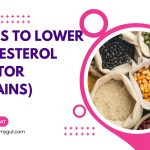9 Foods That Cause Diarrhea With Metformin.
Our content is not intended nor recommended as a substitute for medical advice by your doctor. Use for informational purposes only.
Metformin can cause diarrhea independently of the foods you eat. However, Some foods are known to cause diarrhea. Although they don’t directly interact with Metformin, they can add to the metformin effects on your gut and trigger diarrhea.
But please note that the list of foods below is not contraindicated to take with Metformin. The foods below don’t directly interact with Metformin; They only increase the chances of diarrhea while taking it.
Also, not all people are the same; the same food can affect different people. Therefore, experimentation and food journaling are vital to finding what causes diarrhea the most.
The reasonable approach to these foods is to limit their amounts and not cut them completely.
Common foods that cause diarrhea with Metformin include:
- Fatty foods.
- Too much fructose (found mainly in fruits).
- Milk and dairy products.
- Sugar substitutes (including aspartame used by people with diabetes.
- Other high-FODMAP foods.
- Coffee and other caffeinated products.
- Alcohol.
- Fried and fast foods.
- Spicy foods.
1. Fatty foods.
When you eat fat or fatty foods beyond your body’s need, they will be excreted in the stool. Any fat exceeding the absorption capacity will travel from the small intestine to the colon.
Fat will break down into fatty acids and cause diarrhea, which adds to metformin-induced diarrhea.
Also, some people are more sensitive to fatty foods than others. For example, people with a phenomenon called (Exaggerated gastrocolic reflex) will have diarrhea more frequently after eating fatty foods.
An exaggerated gastrocolic reflex is how your colon responds immediately after the food reaches your stomach. For example, some people experience increased colon motility after eating fatty foods leading to diarrhea.
Fat is known to exaggerate the gastrocolic reflex and cause diarrhea. Taking Metformin while eating fat will trigger more diarrhea.
Some people may have trouble absorbing fat (as with chronic pancreatitis and bile acid diarrhea). In such cases, fat will trigger severe forms of fatty (greasy) diarrhea with or without Metformin.
Common examples of fatty foods that trigger diarrhea:
- Fatty meats.
- Poultry skin.
- Butter.
- Heavy creams.
- Bacon.
- Soft Cheese.
2. Too Much fructose.
Fructose is the chief sugar in most fruits. It is also found in abundance in honey and table sugar.
Fructose is a short-chain carbohydrate that rapidly ferments and causes diarrhea when consumed excessively.
According to Dr. Norton Greenberger from Harvard Medical School, 75% of people will get diarrhea from ingesting 40-80 grams of fructose.
The more you eat, the more likely it will add to metformin effects and cause diarrhea.
But don’t cut these fruits completely. Instead, choose fruits with low fructose, and consume them in moderation to avoid diarrhea.
Most common sources of fructose:
- Table sugar.
- Honey
- Most fruits and fruit juices are apples (see the table below).
- High-fructose corn syrup in candy, baked goods, and other processed foods.
The table below illustrates The free fructose in selected fruits (% fresh weight basis) (reference).
| Food | d-Fructose percentage |
|---|---|
| Apples, raw, unpeeled | 7.6% |
| Apricots, raw | 0.7% |
| Apricots, dried | 12.2% |
| Bananas, raw | 2.7% |
| Blueberries, raw | 3.6% |
| Cherries, raw, sweet | 6.2% |
| Cherries, raw, sour | 3.3% |
| Figs, raw | 2.8% |
| Figs, dried | 26.0% |
| Grapes, raw, American | 6.9% |
| Grapes, raw, European | 7.6% |
| Prunes, dried | 14.8% |
| Raisins, dried | 33.8% |
| Peaches, raw | 1.3% |
3. Too much lactose (in milk and dairy products).
Lactose is the chief sugar in milk and other dairy products. Children are more capable of digesting lactose because milk is the only energy source.
However, most people start to lose the ability to digest lactose when they grow older. A condition known as lactose intolerance. Most cases of lactose intolerance are due to a phenomenon called (lactase non-persistence).
What (lactase non-persistence) means is a natural decline of the lactase enzyme activity (responsible for lactose sugar digestion) with age.
As a result, Over 65% of adults worldwide are lactose intolerant. In addition, some nations and races are more intolerant to lactose than others (reference).
Symptoms of lactose intolerance:
- Diarrhea (exaggeration of metformin-induced diarrhea).
- Abdominal pain.
- Bloating.
- Distension and gas.
- Nausea after eating or drinking milk.
- A sense of fullness.
- Less commonly, headaches, muscle pain, joint pain, and loss of concentration.
The more you eat from milk and other dairy products, the more likely you will get diarrhea with Metformin.
Experiment with the maximum amount of lactose you can tolerate, or try lactose-free products.
4. Sugar substitutes.
Sugar substitutes are a group of compounds, including artificial sweeteners (aspartame, saccharin, and sucralose) and sugar alcohols (such as mannitol, sorbitol, and xylitol.
Ask your doctor or dietitian about the best option to avoid diarrhea and control your blood sugar simultaneously. Common foods that contain artificial sweeteners:
- Diet sodas.
- Sugar-free candies and desserts.
- Chewing gum.
- Reduced-sugar cereals.
- Low-sugar condiments, like coffee creamer and ketchup.
Sugar substitutes are rapid fermenters and induce diarrhea when consumed with Metformin.
Either avoid them entirely with Metformin or consume the lowest amount possible.
5. Coffee and other caffeinated products.
Caffeine is a known trigger for diarrhea. Caffeine is a gut stimulant; it speeds up the muscle contractions of the digestive tract.
Taking caffeine with Metformin may enhance the gastrointestinal side effects of the drugs, mainly diarrhea.
Try limiting or avoiding caffeine consumption if you’re experiencing diarrhea with Metformin.
Caffeine is found in:
- Coffee.
- Caffeinated drinks such as Energy drinks.
- Chocolate.
- Soda.
- Tea.
- Caffeine-containing supplements.
Others
In this section, we gathered other foods that can cause diarrhea with Metformin to keep it short. Also, try limiting or avoiding such foods if you get diarrhea with Metformin.
6. Garlic and onion.
7. Alcoholic drinks.
8. Broccoli and cauliflower
9. Spicy foods.
10. Fried and fast foods.
Should you stop Metformin due to diarrhea?
Metformin is one of the most common and beneficial medications for treating Diabetes Mellitus. It is recommended as the first-line treatment for type two diabetes by the American Diabetes Association (ADA).
However, its use is limited by its gastrointestinal side effects. Diarrhea is prevalent with Metformin, especially the immediate-release formula.
The incidence of diarrhea with Metformin is (reference):
- 53% with the immediate-release (IR) tablets.
- 10% with the extended-release (ER) tablets.
Doctors stop Metformin and shift to other medications due to such side effects. However, Before stopping Metformin, please work with your doctor to limit its impact on diarrhea by shifting to the extended-release formula.
Essential Tips to reduce Metformin-induced diarrhea:
- Shift to the Extended-Release (ER) formula.
- Take it with Meals.
- Avoid rapid dose increase.
- Ask your doctor about decreasing the dose.
- Ask your doctor about a (Metformin Holiday).
- Try a probiotic.
The treatments for metformin-induced diarrhea are discussed in detail in this in-depth article.
Don’t Stop Metformin without consulting your doctor. It may affect your blood sugar levels and cause complications.
- Evidence-based
- Written by a doctor.






